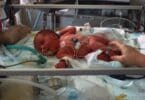 In most of North America, a baby under the age of 24 weeks may not be resuscitated if delivered before that gestation.
In most of North America, a baby under the age of 24 weeks may not be resuscitated if delivered before that gestation.
Doctors in Missoula, Montana must have seen something that made them think that this baby was different because on April 27 at 1 pound, 1.7 ounces, Sasha is the most premature baby born at Community Medical Center’s NICU. Nine in 10 infants at her gestational age die.
Even though at birth doctors had told new mom, Jacqueline Peterson, to be ready to say goodbye to her daughter, the little fighter had different plans.
Arriving prematurely at 22 weeks and six days, Sasha’s footprints were only slightly larger than the print of her moms right index finger.
She had no body fat, the size of a pinky finger and needed to stay in a special isolette that kept helped decrease the amount of water loss and infection.
Leaning over Sasha in the delivery room, Dr. Jan Hiller, 58, one of two neonatologists at the hospital had heard the baby trying to cry.
“It was a sign that we might have something we could work with, but it’s no guarantee,” Hiller says. “The majority of neonatologists do not actually attempt to resuscitate under 23 weeks. The chances of survival are so slim. The majority of us feel it is futile, if not cruel, to put them through all the procedures.”
The doctoring is intense, especially for the first 10 days of the baby’s life, and Sasha is given about a 15 percent chance of surviving her first week. The NICU team is vigilant, watching for typical complications including brain bleeds, stiff lungs and the vision problems. The premature babies have immature immune systems, making them more susceptible to infections and liable to get sicker than other babies. More problems can arise when nurses start feeding the babies, because of their immature gastrointestinal systems.
In the next couple of weeks Sasha will undergo a fairly common preemie surgery to fix a condition called patent ductus arteriosus. The surgery closes the fetal blood vessel which has failed to shut after birth, depriving her of sufficient oxygen.
Just before leaving the hospital, she also has laser surgery to correct abnormal growth of the blood vessels to her eyes, called retinopathy of prematurity (ROP), which can lead to retinal detachment. Even after the surgery, there’s a one in three risk of vision problems later.
While her NICU stay is fairly un-eventful, a baby born at this gestation should not have survived at all.
At 22 weeks gestation, a baby’s eyes are still fused shut and will not open for up to 3 weeks. These little guys have yet to start to hear and they normally measure just 10 inches long.
After only spending 122 days in the special care nursery, Sasha goes home on oxygen. Her parents are just happy to have her at home.
We wish this family they best!
Related Articles:
- 8 Year-old Boy Creates Gift Baskets For Premature Babies
- Mom Recalls How Her Preemie Was Kept Alive By Tickling Her Feet
- Baby With Heart Defect Finds Family After Being Put Up For Adoption Twice
- 24 Weeker Born In Toilet Is Thriving After Low Odds Of Survival






